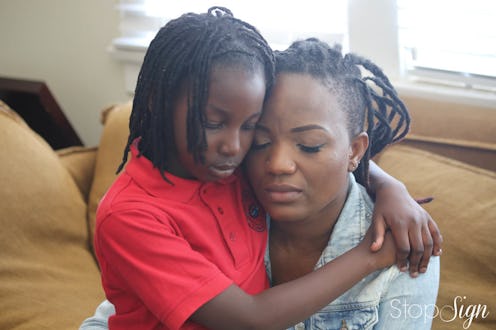Entertainment
A Powerful New Film Is Shedding Light On Unjust Marital Rape Laws Across The U.S.
It's no secret that when it comes to movies and TV, rape often doesn't get proper, realistic coverage — especially when it comes to assaults committed by a person's husband or wife. That's why the new short film Stop Sign, which tackles the subject of spousal rape, is so crucial. The movie not only focuses on the all-too-common issue, but sheds a light on the horrifying fact that in some U.S. states, spousal rape is treated differently under law than other forms of rape.
You might, of course, be aware that spousal rape exists, but Stop Sign will undoubtedly open your eyes to the unjust way some states handle the cases. Since 1993, marital rape has been illegal in America, but a 2015 Vocativ report stated that there are some 13 states where marital rape laws are far from legally just. For example, in Ohio, there is a loophole in the law that states prosecutors must prove there was “force or the threat of force” for a sexual attack by a husband or wife to be considered rape. In South Carolina, meanwhile, a person can get up to 30 years in prison for a non-spousal rape, but just 10 years at most for spousal rape. This same state also claims that rape can only be legitimate if there is "the use or the threat to use a weapon ... or physical violence of a high and aggravated nature."
In Rhode Island, law states that rape isn't legitimate if the spouse knows that their partner is "mentally incapacitated, mentally disabled, or physically helpless." And under Mississippi law, "a person is not guilty... if the alleged victim is that person's legal spouse and at the time of the alleged offense such person and the alleged victim are not separated and living apart."
These loopholes and conditions are utterly ridiculous, and they make things harder for victims trying to report their cases and put their rapists in jail. Stop Sign, directed by Stephanie Ike, discusses this outrageous unfairness. The film follows what happens after the seemingly charming Tyree (Darius L. Carter), rapes his wife, Jada (Emambu Atabong), and Jada's forced to deal with the physical and emotional consequences.
In the movie, "you're not just seeing a 'rapist,' you're seeing someone from the different angles that the victim has been exposed to," explains Ike, in a phone conversation with Bustle. "[This] often makes it hard for them to speak up about it because it could mean they are labeling the 'abuser' as one thing — a rapist. When they know him in different ways."
Rape, Abuse & Incest National Network states that victims of spousal rape often feel pressured to preserve their marriages, and some people may not be able to come to terms with the fact that their spouses are “rapists" due to their other feelings towards them. This can contribute to less justice being served, as well as a reduced awareness of marital rape compared to other widely publicized forms of sexual assault.
For many people, spousal rape, or rape by a loved one, seems like a rarity, but according to the National Sexual Violence Resource Center, 80 percent of rape victims know their assailant. As shown by those state laws, marital rape cases are often regarded as less severe than other types of cases because of the connection between assailant and victim. But this, of course, is incredibly unfair to victims of spousal rape. As Psychology Today reports, marital rape victims can experience long lasting trauma; Raquel Kennedy Bergen, Professor and Chair of Sociology at Saint Joseph’s University in Philadelphia, notes that these victims are “more likely to experience multiple assaults and often suffer severe long-term physical and emotional consequences.”
That's why it's so important to have films like Stop Sign shed light on the lasting effects of marital rape and the frequency at which it occurs. "We're speaking about a topic that's rarely spoken about... people question, 'how can a man rape his wife?'" says Ike. "We're not just touching on the victim, but the brokenness of the oppressor."
With more awareness and proper understanding of consent, no matter the circumstance, we can all help create a culture where people understand that the reality of sexual assault goes beyond the too-thin narratives we see in media.
